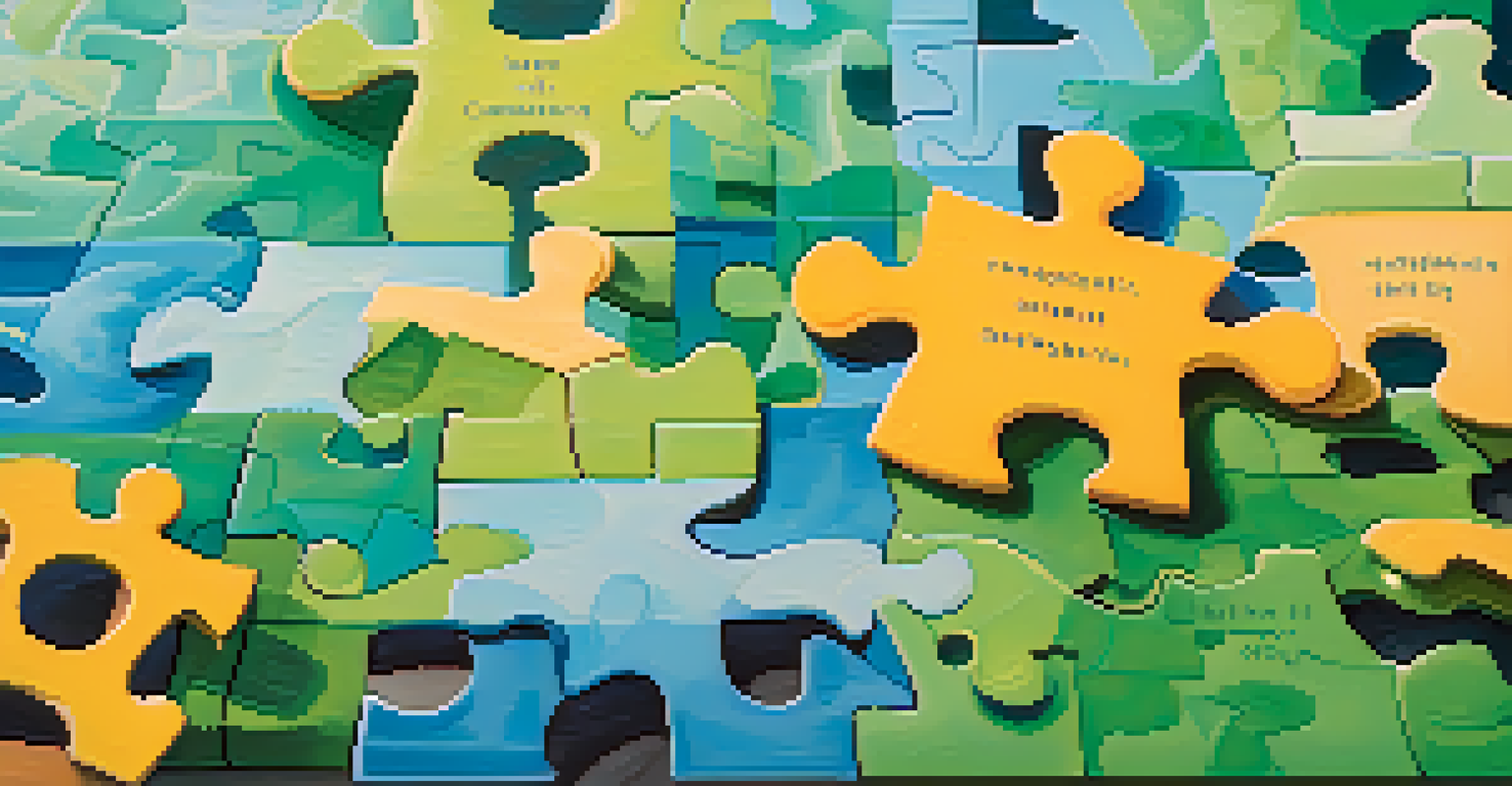Conflict Resolution: A Vital Skill for Healthy Relationships

Understanding Conflict in Relationships
Conflict is a natural part of any relationship, be it personal or professional. It arises when individuals have differing opinions, values, or needs. Recognizing that conflict is normal can relieve some pressure and make it easier to address issues head-on.
Conflict is inevitable, but combat is optional.
When we understand that conflict isn't necessarily negative, we can approach it as an opportunity for growth and deeper understanding. Think of it like a storm; while it may cause temporary chaos, it often clears the air and allows for fresh perspectives.
Embracing conflict allows us to learn more about ourselves and each other. This understanding lays the groundwork for more effective conflict resolution strategies, paving the way for healthier interactions.
The Importance of Communication in Conflict Resolution
Effective communication is the cornerstone of resolving conflicts. When faced with a disagreement, expressing your thoughts and feelings clearly can prevent misunderstandings from escalating. It’s like using a map to navigate; without clear directions, you’re likely to get lost.

Active listening plays a crucial role here as well. By genuinely hearing the other person’s perspective, we show respect and create an environment for open dialogue. This not only validates their feelings but also fosters trust.
Conflict is a Growth Opportunity
Viewing conflict as a natural part of relationships allows for personal and relational growth.
Ultimately, good communication helps both parties feel heard and valued, which can turn a potentially harmful conflict into a constructive conversation. It sets the stage for finding common ground, essential for healthy relationships.
Strategies for Effective Conflict Resolution
Having a few strategies in your toolkit can make navigating conflicts much smoother. Techniques like 'I' statements can help express your feelings without sounding accusatory. For example, saying 'I feel upset when...' is often more effective than 'You always make me upset.'
In the midst of conflict, understanding is the key to resolution.
Another valuable strategy is to focus on the issue at hand rather than personal attacks. Staying on topic can prevent discussions from spiraling into hurtful comments that only add fuel to the fire. It's akin to keeping your eyes on the prize.
Lastly, consider taking a break if emotions run high. Stepping away for a moment to collect your thoughts can provide clarity and reduce tension. This pause can turn heated debates into rational discussions, allowing for better outcomes.
The Role of Empathy in Resolving Conflicts
Empathy is a powerful tool in conflict resolution. By putting ourselves in someone else’s shoes, we can understand their feelings and motivations better. This not only helps in addressing the conflict but also strengthens the relationship.
Imagine trying to solve a puzzle without knowing what the final picture looks like. Empathy provides insight into the other person's perspective, making it easier to find solutions that satisfy both parties. It’s about finding that common thread.
Communication is Key to Resolution
Effective communication and active listening can transform conflicts into constructive conversations.
When both sides practice empathy, it creates a collaborative atmosphere. This shared understanding can lead to more effective resolutions, transforming conflicts into opportunities for deeper connections.
Setting Boundaries: A Key to Healthy Relationships
Setting clear boundaries is vital in preventing conflicts from arising. Boundaries help define what is acceptable and what is not, ensuring that both parties feel respected. Think of boundaries as the lines on a soccer field; they keep the game fair.
When boundaries are communicated effectively, it minimizes the chances of misunderstandings. For example, if you need personal space, expressing that need upfront can prevent future friction. It’s all about being proactive rather than reactive.
Healthy boundaries also promote self-respect, allowing individuals to voice their needs without fear. This mutual respect fosters an environment where both parties can thrive, ultimately leading to stronger relationships.
Finding Common Ground Amidst Conflict
Finding common ground can be the key to resolving disputes. When conflicts arise, focusing on shared goals or values can help shift the conversation from confrontation to collaboration. It’s like building a bridge between two sides, creating a path forward.
Consider using questions that emphasize connection, such as 'What do we both want to achieve?' This approach not only highlights mutual interests but also encourages teamwork in finding solutions. It’s about working together rather than against each other.
Empathy Strengthens Relationships
Practicing empathy fosters a collaborative atmosphere, leading to more effective conflict resolutions.
Ultimately, identifying common ground fosters a sense of unity. When both parties feel aligned in their objectives, the resolution process becomes smoother and more meaningful, strengthening the bond between them.
Learning from Conflict: Growth Opportunities
Every conflict presents a unique opportunity for growth. After resolving an issue, take a moment to reflect on what you learned about yourself and your relationship. This reflection is akin to a gardener tending to their plants, nurturing growth through care and attention.
Analyzing how conflicts were handled can also highlight patterns or behaviors that may need adjustment. For instance, if you notice a tendency to escalate disagreements, recognizing this can empower you to approach future conflicts differently.

In essence, viewing conflict as a chance for personal and relational growth can transform how we engage with others. Embracing this mindset fosters resilience and strengthens relationships in the long run.